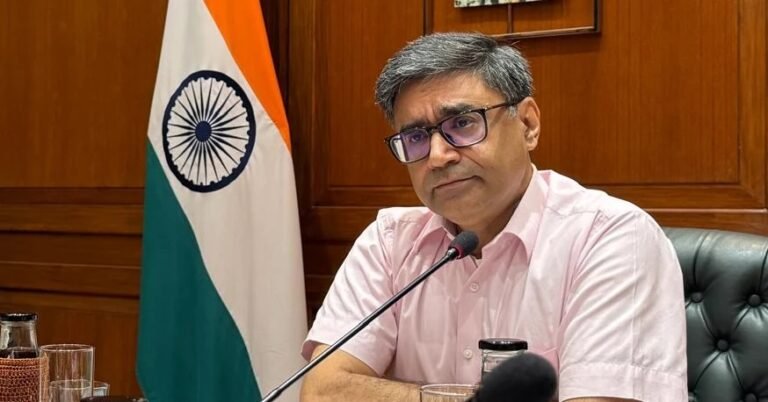Reiterating that India firmly supports “free, fair, inclusive, and participatory elections” in Bangladesh at the earliest possible time, Indian Foreign Secretary Vikram Misri on Monday said that India will work with any government that emerges through the mandate of the people of Bangladesh, reports UNB.
The Indian Foreign Secretary said they are ready to work with the democratically elected government following the results of an “inclusive and participatory” election.
“We remain ready to engage with any government that emerges from these elections with a popular mandate,” he said while responding to a question during an interaction with members of the Diplomatic Correspondents Association, Bangladesh (DCAB) at India’s Ministry of External Affairs (MEA).
MEA Spokesperson Randhir Jaiswal, Joint Secretary (Bangladesh & Myanmar) B. Shyam, DCAB President AKM Moinuddin, and General Secretary Md Arifuzzaman Mamun were also present.
During the nearly hour-long discussion, the Indian Foreign Secretary responded to questions on bilateral relations, border management, water-sharing issues, and matters concerning former Prime Minister Sheikh Hasina, who is currently staying in India.
The Foreign Secretary acknowledged that some issues exist, which is natural in any bilateral relationship.
A 23-member DCAB delegation is currently visiting India at the invitation of the government of India.
The Foreign Secretary said one important issue being closely watched not only in the region but also globally is the next steps in Bangladesh’s internal political process.
“We have all seen the announcements and statements regarding the next elections in Bangladesh. I understand that a time frame around February has been indicated in this regard,” he said.
He added that India is encouraged by the fact that Bangladeshi authorities themselves have spoken about a timeline for the elections and that India looks forward to their successful conduct.
“It will be a government elected with a popular mandate, and we will work with whichever government the people of Bangladesh choose to represent them,” Foreign Secretary Misri said.
Peace and Stability
Referring to India’s role in the region, the Foreign Secretary said that India has a significant stake in the peace, progress, stability, and development of Bangladesh.
“All of these issues are linked to regional stability, and we attach the highest importance to that — not just for ourselves but also because it serves our mutual interests,” he said.
When asked about the possibility of elections excluding a major political party, Misri said, “I obviously cannot get into the middle of decisions made by authorities in Bangladesh. The authorities, the people, and civil society in Bangladesh will have to make their own assessment of how these elections are viewed both domestically and internationally.”
He added that it is not only a matter of internal legitimacy but also one of external perception.
“These decisions will not just affect the present but will have implications in the medium to long term. Ultimately, it is for the people of Bangladesh to decide,” Misri said.
He noted that the elections will undoubtedly express a certain mandate.
“When it comes to the conditions shaping that mandate, India will not interfere. That is something for the people of Bangladesh to determine,” he said.
Engaging Interim Govt
He also mentioned that even after the events of July and August last year, India has continued to work with the authorities in Dhaka, despite the unusual nature of the current political arrangement.
“That hasn’t prevented us from working with or engaging the authorities,” he said.
Misri noted that Prime Minister Narendra Modi was among the first leaders to congratulate Professor Muhammad when he assumed charge as the head of the interim government, followed by a series of subsequent engagements.
When asked about Pakistan–Bangladesh relations, the Foreign Secretary said he would not comment on Bangladesh’s relations with a third country.
Time-Tested Relationship
“I can only say that we value our relationship with Bangladesh. We have a stake in its peace, progress, stability, and development. All of these have a bearing on regional security and stability,” he said.
“We have had close discussions with the authorities in Bangladesh on these matters in the past, and I am sure we will continue to do so,” he added, expressing confidence that Bangladesh recognizes the importance of regional stability and security for all.
The Foreign Secretary said the India–Bangladesh relationship is rooted in strong cultural, linguistic, religious, and historical ties.
“These are factors that continue to underpin our relationship. We have always approached it with a people-first mindset,” he said.
“This is a time-tested relationship — more than five decades old — and I am confident it will continue to flourish,” Misri added.
He said India’s approach toward Bangladesh has always been pragmatic.
“We are no strangers to the momentous developments that have taken place in the region, the world, and in Bangladesh. Our pragmatic approach has guided our engagement with the authorities, including the interim government,” he said.
“The only point I would make is that for this engagement to be sustained and to serve as the basis for even stronger ties in the future, both sides need to work toward creating a conducive environment,” he noted.
The Foreign Secretary concluded by emphasizing the importance of avoiding statements or actions that could harm the bilateral atmosphere.



